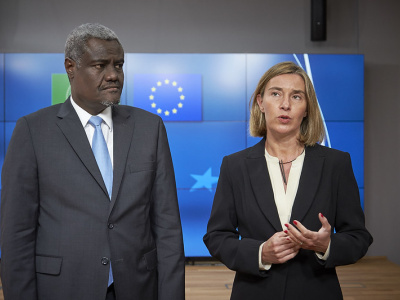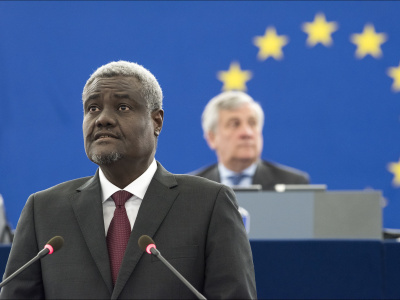
Investing in culture and creativity: Reflections from the European Development Days
Greta Galeazzi takes stock of the talks that took place during the session on investing in creativity at the European Development Days 2017.
Last year, as I was travelling for work in West Africa, I met many young creatives and artists that use their skills and creativity to make art and also, through their activities, promote social cohesion and create employment and jobs. This year, I have found some of the same people at the European Development Days, bringing their experiences to European and African policy and decision makers that can play a role in supporting the emerging cultural and creative industries in some African countries.
The transformative power of culture
The panel ‘Investing in culture and creativity’, co-organised by ECDPM together with 13 leading organisations, as well as two brainstorming meetings between partners, discussed how best to support culture in developing countries.
The main takeaway is that investing in culture is a long-term endeavour, as signalled by economist Felwine Sarr, because the “return on investment” is not financial. Indeed, as Jean-Louis Ville from the European Commission argued, culture is the cement that brings society together and holds transformative power.
Accessing funds for culture
Therefore investment needs to combine different sources of funding, adapted to each specific context and to the diversity of the cultural actors. Some sectors of the cultural and creative industries – such as audiovisual, some types of performances, and fashion – can be profitable and can benefit from loans or guarantees. For instance, during my work, I came across the case of creative businesses funded by Heva Fund in East Africa or digital ventures supported by Orange in West Africa.
There are cultural activities that are not necessarily profitable. Hence, the need for patient support from the public sector and donors – at arms’ length, not to influence the content and messages expressed by artists. This is particularly the case for those artists and cultural operators that choose to work with rural communities or in informal neighbourhoods. There, the artistic activities often include a social and educational purpose. For these types of initiatives, the support of philanthropy – local or international – foundations and donor agencies is paramount.
In the case of grassroots organisations, we often talk about relatively small sums but big donors are not always geared towards disbursing small grants. Malian singer Rokia Traoré explained how difficult it can be to access funds for culture. In this context, approaches like “regranting” to facilitate small grants distribution, such as it exists in the EU-funded programme MedCulture, can inform donors wishing to support grassroots, cultural actors. Ensuring that a diverse set of actors, beyond the “usual suspects” and the big players, has access to resources for artistic work is key to ensuring vibrant local cultural scenes.
Singer and songwriter Rokia Traoré explained that artists are the first cultural entrepreneurs in many African countries but too often culture receives the least attention and resources by policymakers. Yet local and national authorities can, among other actions, set up the appropriate regulatory frameworks and legislation, devote funds to cultural operators, and leverage investments in the sector, including promoting tourism. A strategic approach that ensures respect for cultural diversity is crucial.
Learning from each other
Drawing on experiences and expertise in other countries – for instance through the UNESCO Expert Facility but also from EU’s cooperation schemes like Twinning and Taiex – can help governments to develop appropriate and inclusive public interventions.
In addition, while skills and capacities of artists are already increasing and very often comparable to professionals elsewhere, cultural actors still express the wish to learn from other experiences. Not surprisingly this is underlined by the research for the Preparatory Action for Culture in EU External Relations.
Artists in developing countries can learn from each other and yet too few donors are supporting intra-regional mobility. In addition, exchanges between African and European artists can help to break down stereotypes and promote a more genuine understanding of each other. Facilitating mobility and visas for artists and cultural operators in the two directions is a key component of a strategic EU approach to international cultural relations.
In fact, the EU has brought back culture in development cooperation but also in its external action, as explained by DG DEVCO’s Head of Unit Jean-Louis Ville. This is because, as he concluded, culture has a role to play in international relations.
Exchanges between African and European creatives – in particular youth – can foster better mutual understanding and dialogue among societies that share many similar challenges. This is why it’s necessary, more than ever, to fight the stereotypical views of each other that prevent this dialogue.
The views expressed here are those of the author and not necessarily those of ECDPM.



